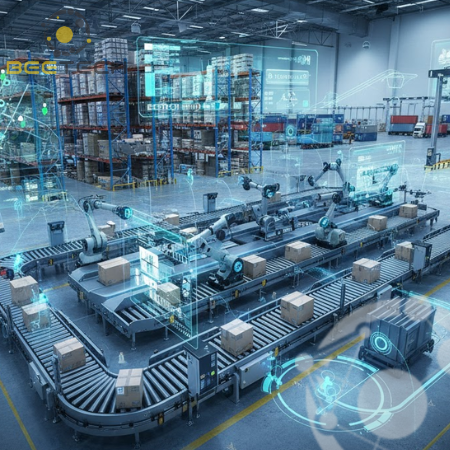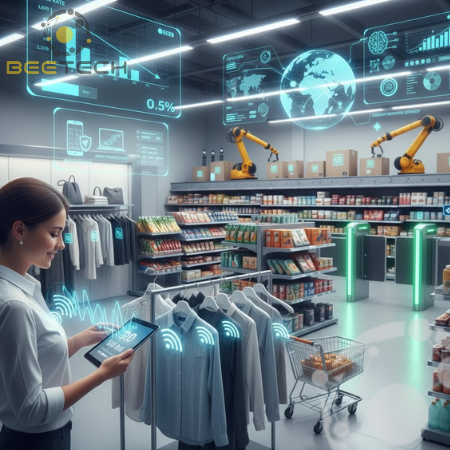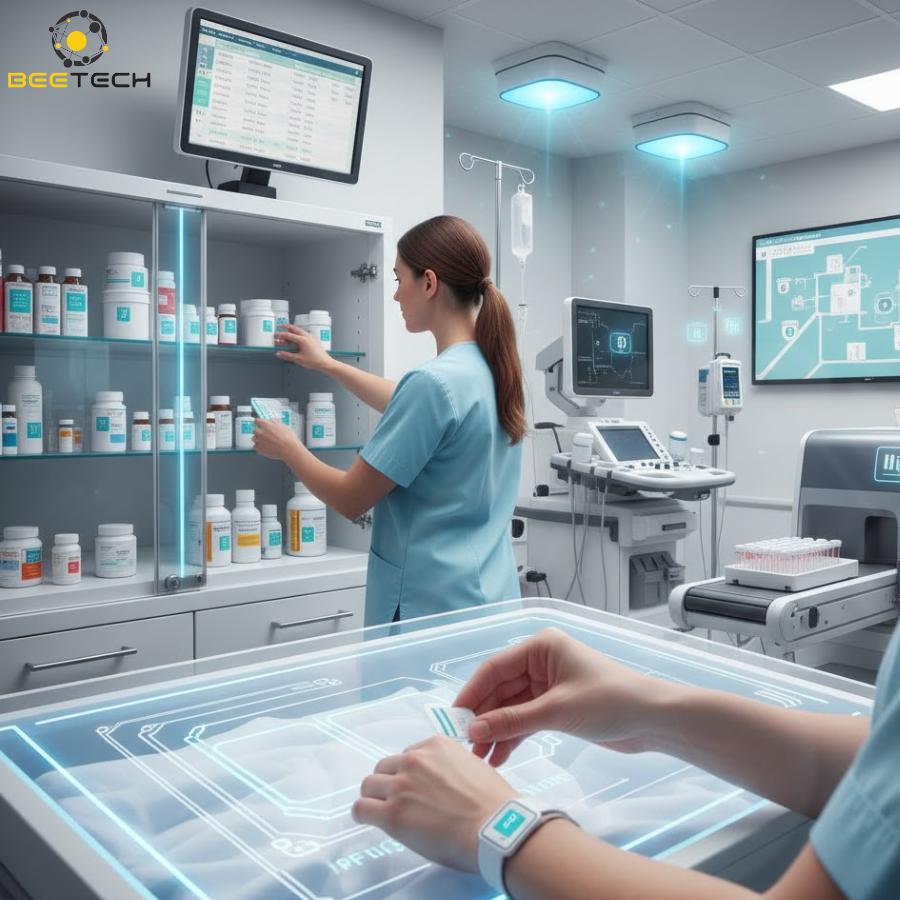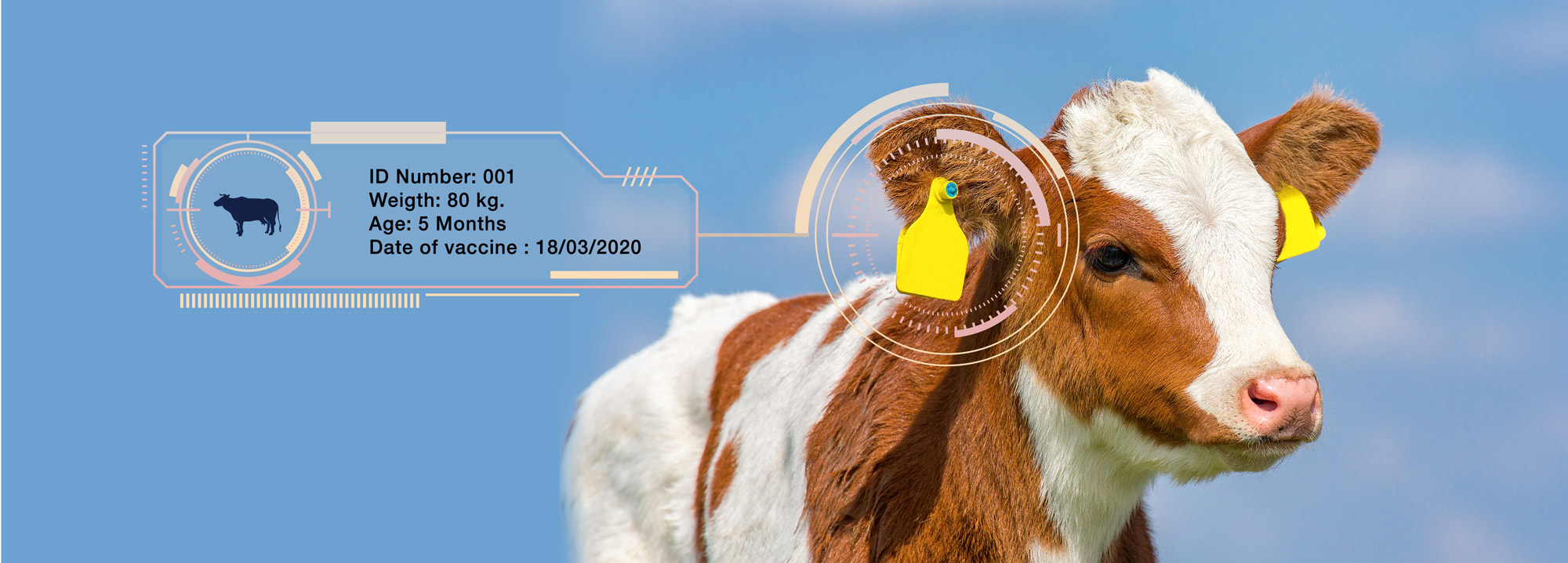80-82 Cao Duc Lan, District 2, HCMC, Vietnam
+84 76 865 6688
info@beetech.com.vn
+84 76 865 6688
About us
Contact us
80-82 Cao Duc Lan, District 2, HCMC, Vietnam
+84 76 865 6688
info@beetech.com.vn
+84 76 865 6688
About us
Contact us

TOP 7 INDUSTRIES WITH THE STRONGEST RFID APPLICATIONS TODAY
In the era of global digital transformation, RFID (Radio Frequency Identification) has become one of the fastest-growing technologies across all sectors. With its ability to identify, track, and retrieve data in real time, RFID enables businesses to operate with higher accuracy, save significant time, and optimize operating costs.
Beyond logistics and warehousing, RFID is now widely adopted in nearly every industry, from manufacturing and healthcare to retail, education, and even financial services.
The article below summarizes the TOP 7 industries where RFID is most powerfully applied today, complete with detailed analysis, key benefits, and future trends.
RFID is a radio-frequency identification technology that allows users to scan and collect data from multiple tags at once—without needing direct line-of-sight like barcodes.
Thanks to these strengths, RFID has become one of the most essential technologies for building smart supply chains, smart factories, smart hospitals, and next-generation logistics systems.
Below are the seven industries that benefit most from RFID today, offering the highest impact and efficiency.
In logistics and supply chain management, RFID is considered irreplaceable due to its ability to track goods continuously, accurately, and at high speed. Large-scale logistics hubs, fulfillment centers, transportation companies, and e-commerce platforms are all deploying RFID widely.

RFID eliminates manual barcode scanning—which is slow and prone to errors. When a pallet or package passes through an RFID gate, the system automatically:
Captures EPC codes of each item
Records exact check-in/check-out times
Syncs data with shipping orders
Updates quantity and location in the WMS
This prevents mis-shipments, wrong entries, and warehouse shrinkage.
With handheld RFID readers, staff can simply walk along the aisles to capture all products:
5,000 items counted in just 2–5 minutes
No need to touch or open boxes
No disruption to arrangement or packaging
RFID enables multiple inventory checks per day with near-absolute accuracy.
RFID provides visibility into:
What shelf a product is on
Which areas are running low
Which items are aging in stock
Which lots are ready for dispatch
This is critical for quality control, FIFO/FEFO, and eliminating order delays.
With RFID tags on parcels or containers, companies can:
Record loading/unloading times
Monitor transportation routes
Track final delivery events
Analyze warehouse dwell time
This keeps the entire supply chain synchronized and reduces operational costs.
In retail, RFID supports the shift from traditional stores to Smart Retail, providing superior inventory visibility and an improved shopping experience.

A fashion store normally needs 2–3 hours for a full barcode inventory. With RFID:
Only 3–5 minutes for the entire store
98–100% accuracy
No need to collect items at the counter for scanning
This is especially valuable for large retail chains.
RFID EAS gates detect unpaid items leaving the store, helping:
Prevent shoplifting
Reduce internal losses
Increase operational transparency
Many supermarkets are switching from magnetic EAS to RFID for higher accuracy.
RFID-enabled checkout systems allow:
Reading the entire basket in one scan
No need to open bags or scan each item
Up to 70% faster payment processing
Many smart stores in Korea, Japan, and the US use RFID checkout.
Each RFID-tagged item allows:
Easy retrieval of misplaced products
Real-time shelf visibility
Faster customer assistance
This enhances customer satisfaction and increases conversion rates.
RFID plays a central role in manufacturing, where precise control of each component and work stage is crucial.

RFID enables the system to identify:
Which stage each product is in
Whether quality checks are complete
Whether it is on the conveyor or in the waiting zone
Which worker is handling the process
This allows real-time production supervision.
RFID helps:
Track usage time
Monitor maintenance schedules
Automate check-in/check-out of tools
Prevent misplacement or loss
This is vital in mechanical, plastics, and electronics industries.
With RFID-tagged materials:
Inbound/outbound is automated
Remaining quantities are monitored
Errors and shortages are detected early
Factories maintain nearly perfect inventory accuracy.
RFID stores complete production history:
Batch codes
Production dates
Operational steps
Quality inspection results
Operator information
This meets the strict standards required by the EU, US, and global export markets.
RFID is becoming a standard in modern medical facilities due to its ability to reduce clinical errors and enhance safety.

RFID wristbands enable:
Verifying patient details at bedside
Matching medication/IV/diagnosis
Preventing surgical mix-ups
This is a major breakthrough in patient safety.
Hospitals have numerous high-value devices:
Ultrasound machines
Medical carts
Patient monitors
Ventilators
Infusion pumps
RFID provides continuous location tracking and usage monitoring.
RFID helps hospitals:
Track expiration dates
Prevent wrong batch entries
Detect shortages
Manage items by lot and serial numbers
Healthcare requires maximum accuracy—and RFID delivers it.
From sample collection → processing → analysis:
Each sample has a unique RFID tag
Automated workflow recording
Zero risk of sample mix-ups
RFID is increasingly standard in modern laboratories.
RFID plays an essential role in smart agriculture, especially as markets demand transparent and traceable origins for food.

RFID allows:
Vaccine history tracking
Growth monitoring
Recording birth dates, breed, weight
Early detection of abnormalities
Large farms use RFID for automated herd management.
Each RFID-tagged lot:
Records the entire journey: planting → harvesting → packing → transporting
Stores real-time environmental and production data
Ensures food safety compliance
This is especially important for fruits, vegetables, and seafood exports.
RFID combined with IoT supports:
Humidity monitoring
Light level tracking
Identifying specific plots
Measuring plant growth
This data helps optimize yield and improve crop quality.
RFID is a foundational technology in intelligent transportation systems.

RFID-tagged vehicles can:
Pass toll booths without stopping
Trigger automatic payments
Reduce traffic congestion
Increase roadway capacity
Many countries now operate 100% RFID-based tolling.
In buildings, hotels, and residential complexes:
Vehicles enter/exit without tapping cards
Gates use license plate recognition + RFID
Shorter waiting times
Enhanced security
RFID eliminates the need for paper tickets or plastic parking cards.
RFID records:
Vehicle entry/exit times
Container locations
Load weight
Movement history
This greatly improves logistics efficiency.
The events industry is rapidly standardizing RFID to enhance experiences and streamline operations.

RFID wristbands enable:
Fast ticket validation
Prevention of ticket fraud
Shorter check-in times
Major global festivals rely on RFID wristbands today.
Attendees can load money onto their RFID wristbands to:
Buy food & drinks
Purchase merchandise
Access services
This offers a smooth, cash-free experience.
Event organizers can:
Know which zones are crowded
Adjust traffic flow
Prevent bottlenecks
This is crucial for large-scale events and theme parks.
RFID is rapidly becoming a core technology across all industries. With its ability to perform long-range identification, read multiple tags simultaneously, provide real-time tracking, and automate workflows end-to-end, RFID is the backbone of digital transformation.
The technology delivers:
Higher efficiency
Reduced operational costs
Lower risk and fewer errors
Greater transparency
Optimized end-to-end operations
Across logistics, retail, manufacturing, healthcare, agriculture, transportation, and event management—RFID continues to demonstrate outstanding effectiveness.
Beetech offers a comprehensive range of RFID technologies, including:
RFID readers, antennas, gateways, and handheld terminals
Diverse RFID tags: UHF, HF, anti-metal, waterproof, livestock ear tags, wristbands
RFID software solutions for warehousing, retail, manufacturing, hospitals, events, agriculture, and transportation
Full installation, integration, and implementation services
📧 Email: info@beetech.com.vn
🌐 Website: https://beetech.com.vn



RFID in Logistics – The Core Technology Powering Modern Supply Chains
17/11/2025 06:21:25

RFID – The “Silent” Technology Transforming How Vietnamese Businesses Manage Their Inventory
13/11/2025 07:16:17

National Assembly Proposes Using Electronic Chips to Monitor Drug Addicts
12/11/2025 03:56:38

Vietnam’s RFID Logistics Market: Rapid Growth from 2025 to 2031
12/11/2025 03:13:47

RFID – When data becomes reality: The journey to building systems of reality in the digital ge
07/11/2025 02:57:55

Challenges in RFID Reading Performance and Environmental Conditions
06/11/2025 02:36:26